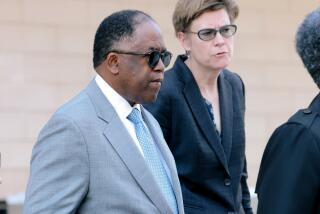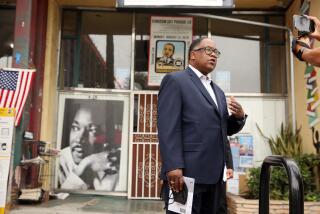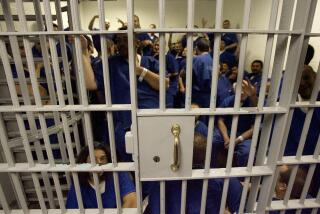Judge Lets Henley Travel but Increases Bail to $1 Million
SANTA ANA — Rams cornerback Darryl Henley, under indictment on drug charges, was granted permission Tuesday to travel to road games, but a federal judge stunned Henley and his attorneys by raising his bail to $1 million and requiring that he be accompanied at all times--even while on the bench--by a court officer.
Henley, charged in a federal indictment with being the mastermind of a cocaine ring that transported drugs using a former Rams cheerleader as a courier, sought a change in his bail restrictions that would allow him to travel outside a seven-county area that includes Orange and Los Angeles counties.
But Henley and his attorneys gasped when U.S. District Judge Gary L. Taylor suggested that his previously set bail of $200,000 was too low and should probably be increased to $2 million or $3 million to ensure that he doesn’t flee while he travels with the team throughout the country.
“This is not about playing football,” Taylor said firmly when Henley’s attorneys objected. “This is a case that has a maximum sentence of life in prison and a very large minimum sentence. . . . This is a dangerous and important case.”
Taylor increased bail to $1 million, saying he believed the previous bond was too low when set by a federal magistrate last year. Taylor had expressed similar reservations when he recently set bail at $500,000 for Henley’s uncle, Rex Henley, who is also charged in the conspiracy to distribute cocaine but is considered a lesser player in the alleged crimes.
Henley’s $1-million bond, Taylor ruled, could come from a “responsible” third party, such as the Rams, which would have to pledge in an affidavit to pay should Henley flee.
In addition, Henley will have to come up with $100,000 cash up front, to be paid to the clerk of the U.S. District Court. The money is refundable should Henley make all court appearances and meet the other terms of his bail.
Henley said that amount will likely come out of his $350,000 contract with the Rams. He said his agent, Marvin Demoff, will meet immediately with Rams President John Shaw regarding the situation.
In addition, the judge ruled that Henley must be accompanied on the road by a court officer--someone from either pretrial services or the U.S. marshal’s office--at all times, even when Henley sits on the bench during the games.
It is likely that Jessie Flores, his pretrial services officer, will be assigned to accompany Henley. Whoever gets the assignment, it will be at Henley’s expense, the court ruled.
Henley said he has no problem with a court officer accompanying him on out-of-town games and is in no way a flight risk.
“Why in the heck would I flee?” he said. “Why would I run? I’ve been (out on bail) for nine or 10 months. This isn’t fun.”
Taylor had initially suggested to Henley’s attorneys--Gerald L. Chaleff and Roger L. Cossack--that it might be embarrassing to the Rams for such an arrangement to be made, especially because the team is so visible.
“I can see the videotape now of lots of guys in uniform sitting on the bench and then there’s someone in civilian clothes and people are wondering, ‘Who’s that?’ ” Taylor said.
But Chaleff and Cossack agreed to the suggestion, even as they were arguing against bail being raised.
Cossack called Taylor’s initial mention of $2-million to $3-million bail “a major stumbling block” and said it would be impossible for Henley or his family to come up with anywhere near the $200,000 to $300,000 that a bail bondsman typically requires to secure the bond.
After the hearing, Henley’s lawyers were clearly displeased that bail had been raised and said that Henley would require the Rams’ assistance or the money probably could not be raised.
“It will be up to the Rams or some other party,” Chaleff said. “He cannot make $1-million bail.”
After the hearing, Henley said he was happy to be able to travel and hoped to play in Thursday’s exhibition game in San Diego. His attorneys said they would be busy trying to meet all of the terms of the judge’s order.
“I’m playing eight away games,” said Henley, wearing a double-breasted burgundy suit, matching socks and a yellow and green patterned silk tie. “And I’m not getting any special treatment.”
Henley took issue with a report in The Times quoting defense attorneys for other defendants connected with Henley’s case as saying that the football star was getting preferential treatment. Some of the other defendants with lesser roles in the alleged crimes were not afforded bail and are awaiting the January trial in prison while Henley is playing football.
“What kind of special treatment am I getting?” Henley asked. “I haven’t gotten anything. I have not pleaded guilty to anything. I am innocent and that’s what I’ve said all along.”
Henley said he won’t practice today because of a hamstring pull he suffered in practice Monday, and that he’s questionable for Thursday night’s game.
Among other restrictions ordered Tuesday, Henley’s salary will go directly to the pretrial services division and will be held in escrow, only to be paid to Henley for necessities, such as legal fees and living expenses.
When Henley is on the road and is not on the playing field, in team meetings, or otherwise connected with official team gatherings, he must stay in the team’s hotel and cannot join in “social or extracurricular activities,” Taylor said. He is also prohibited from talking with any of the other defendants or witnesses in the case.
Taylor’s decision, however, frees Henley to join the Rams for Thursday’s exhibition game in San Diego and for eight regular-season games throughout the country, including Atlanta, which according to the federal indictment was one of the drop-off points for the cocaine.
Henley was indicted along with a former Rams cheerleader and three others named as participants in a conspiracy to transfer two shipments of cocaine last year from Henley’s home in Brea to locations in Atlanta and Memphis, using the cheerleader as a courier.
The cheerleader, Tracy Ann Donaho, has pleaded guilty and is expected to cooperate with the government against Henley and the others.
Times staff writer Mike Reilley contributed to this report.


